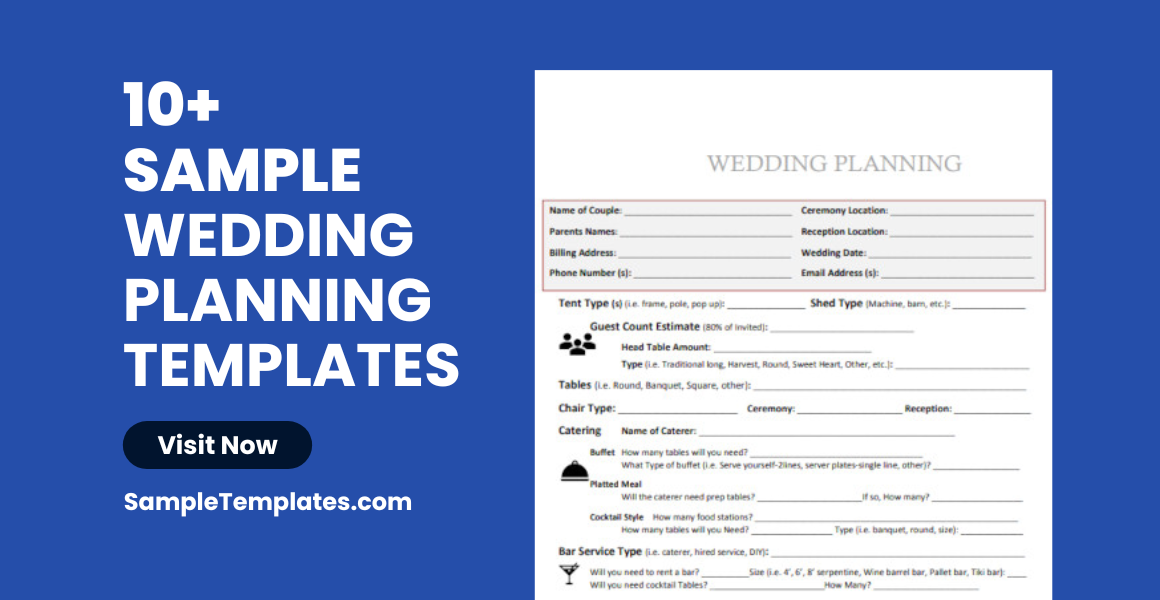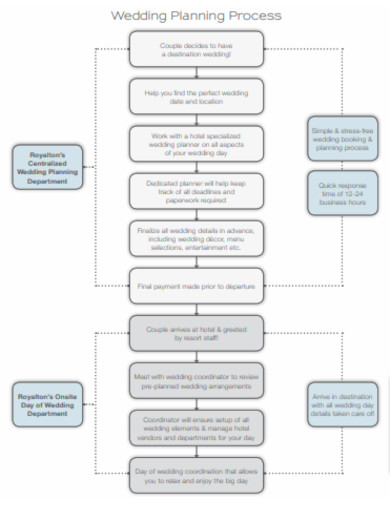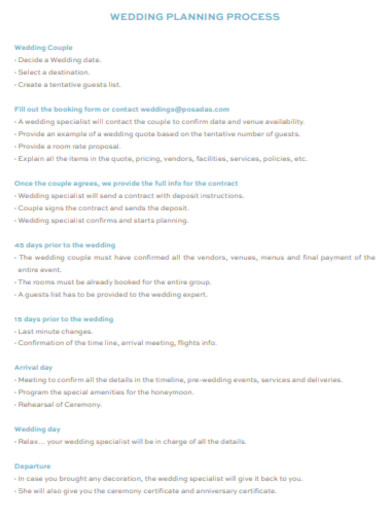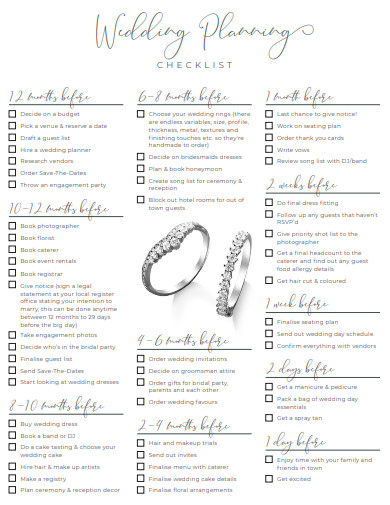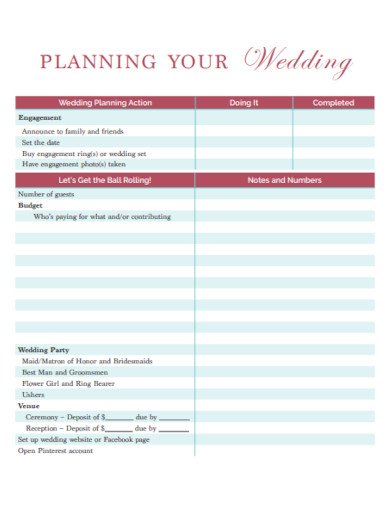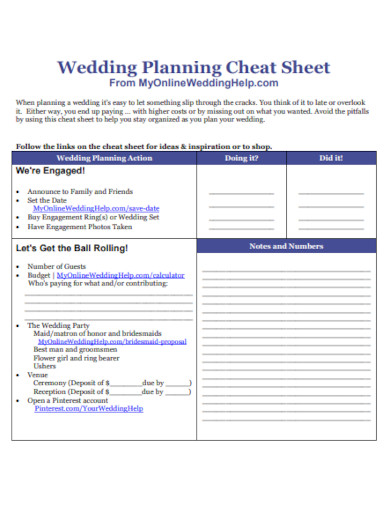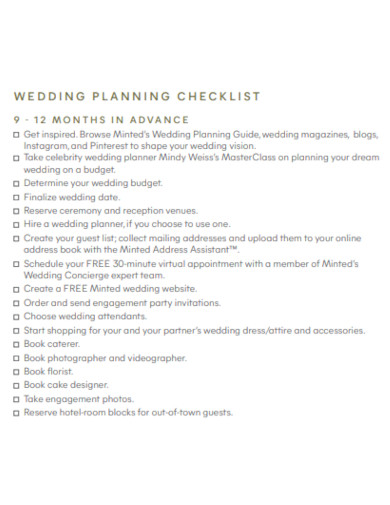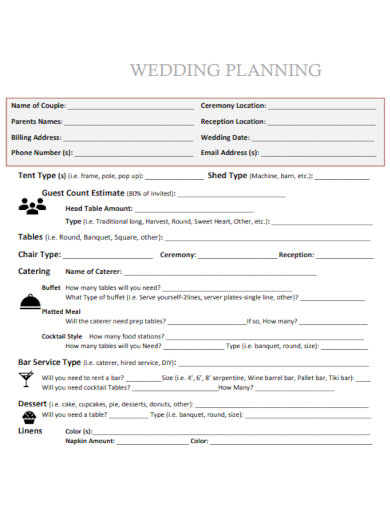Embark on an enchanting path to your special day with our comprehensive Wedding Planning templates. Designed to simplify your journey, these tools ensure every detail is captured, from the whimsical to the essential. Start crafting your unforgettable celebration with confidence, supported by resources tailored for seamless sample planning. Whether it’s a grand affair or an intimate gathering, our templates are your blueprint to a wedding that reflects your unique love story.
10+ Wedding Planning Samples
1. Sample Wedding Planning Timeline Template
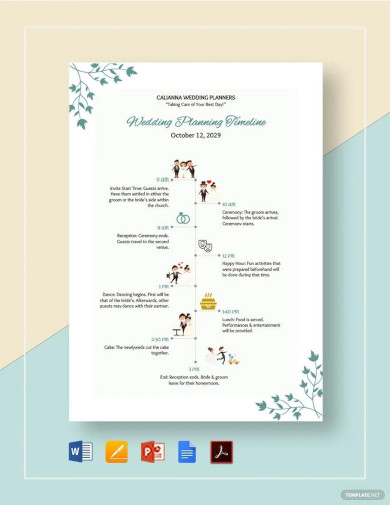
2. Sample Wedding Planning Checklist Template
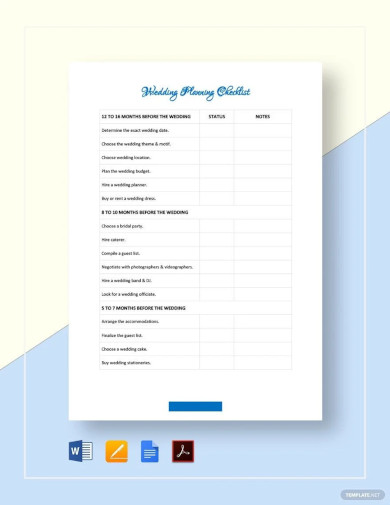
3. Sample Wedding Planning Schedule Template
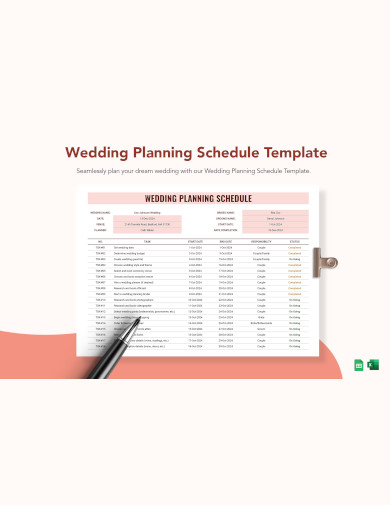
4. Sample Wedding Planning Questionnaire Template
5. Sample Wedding Event Planning Template
What is Wedding Planning?
Wedding planning is the process of managing all the details and logistics involved in organizing a wedding. This can range from the large-scale decisions like venue selection and guest list creation to the minute details such as table settings and music playlists. A wedding planner is often enlisted to ensure that every aspect of the big day is executed flawlessly, allowing the couple to enjoy their special occasion without the stress of managing the event.
Key Responsibilities
- Understanding the Couple’s Vision: The first step in wedding planning is to understand the couple’s style and expectations for their big day.
- Budget Management: One of the most critical aspects is managing the sample budget. Wedding planners help couples allocate their funds appropriately and find ways to maximize their budget.
- Venue and Vendor Selection: Selecting the right venue and vendors is crucial. Planners often have extensive networks and can secure the best fit for the couple’s needs.
- Coordination and Timelines: They create detailed timelines and floor sample plans, ensuring everything from the ceremony to the reception is timed perfectly.
- Problem-Solving: On the wedding day, sample planners are the go-to professionals for solving any unforeseen issues that arise.
The Wedding Planning Process
The process of planning a wedding can be broken down into several key stages:
- Initial Consultation: This is where the planner meets with the couple to discuss their ideas and start the planning process.
- Budget Planning: A detailed budget is created, outlining all the expected costs.
- Venue and Date Selection: The planner assists in finding the perfect venue and date for the wedding.
- Vendor Hiring: From photographers to caterers, the planner helps select and hire various vendors.
- Design and Decor: The aesthetic elements of the wedding are planned, including themes, colors, and decorations.
- Rehearsal Coordination: The planner often helps to organize and run the wedding rehearsal.
- Day-of Coordination: On the wedding day, the planner is present to oversee all aspects of the sample event.
Key Elements of Wedding Planning
- Budgeting for the Big Day Crafting a wedding budget is the first and perhaps most crucial step in wedding planning. It sets the framework for what is feasible and guides the decision-making process for all subsequent choices.
- Venue Selection The venue sets the stage for the entire wedding. It’s not just about finding a beautiful space, but also considering factors like guest capacity, venue services, and logistical concerns.
- Vendor Coordination From photographers to florists, caterers to musicians, wedding planners must select and manage a team of vendors who can bring the wedding vision to life.
- Design and Decor This aspect involves creating a cohesive aesthetic for the wedding, which includes themes, color schemes, decorations, and the overall atmosphere of the event.
- Ceremony Planning The heart of the wedding, the ceremony, requires careful planning of the order of events, the participants (such as the wedding party and officiants), and the legal requirements.
- Reception Details The reception is where guests celebrate the newlyweds, and planning it involves organizing entertainment, food and drink, seating arrangements, and other festivities.
- Logistics and Timeline A detailed timeline ensures that the wedding day proceeds smoothly, with each element transitioning seamlessly into the next.
What You Need to Know Before Planning a Wedding
Embarking on the journey of planning a wedding is both exciting and daunting. Before you dive into the details, there are several key considerations to keep in mind. Understanding these foundational elements can help ensure a smoother planning process and a wedding that aligns with your vision.
Understand Your Vision and Priorities
- Personal Preferences: Reflect on what kind of wedding you and your partner want. Do you prefer a grand affair or an intimate gathering? Understanding your shared vision is essential.
- Priorities: Identify what aspects of the wedding are most important to you both. Is it the location, the food, the music, or the photography? Knowing your priorities will help you allocate your budget effectively.
Set a Realistic Budget
- Financial Assessment: Have an open and honest conversation about finances. Determine how much you can realistically afford to spend on your wedding.
- Hidden Costs: Be aware of potential hidden costs, such as gratuities, service fees, and taxes, which can add up quickly.
Consider the Guest Experience
- Guest List Size: The number of guests will impact your choice of venue and budget. Consider the experience you want your guests to have and who you truly want in attendance.
- Accommodations and Accessibility: Think about the logistics for your guests, including accommodations for out-of-towners and accessibility for those with mobility issues.
Choose the Right Date and Venue
- Season and Date: The time of year will affect many aspects of your wedding, from attire to venue availability. Consider the significance of the date and the season’s impact on your plans.
- Venue Research: Look for venues that align with your vision and analysis budget. Consider the location, capacity, restrictions, and what is included in the rental fee.
Research Vendors Carefully
- Reputation and Style: Research vendors whose style aligns with your vision and who have a solid reputation. Read reviews and ask for references.
- Contracts and Policies: Understand the contracts and cancellation sample policies of each vendor. Know what is included in their services and what might incur additional costs.
Plan for Contingencies
- Backup Plans: Have a plan B for critical elements like the ceremony location in case of bad weather.
- Wedding Insurance: Consider purchasing wedding insurance to protect your investment from unforeseen circumstances.
Understand Legal Requirements
- Marriage License: Research the requirements for obtaining a marriage license in your state or country, including any waiting periods or blood tests.
- Name Change Process: If you plan to change your name, understand the process and what documents you’ll need to update.
Take Care of Yourselves
- Stress Management: Wedding planning can be stressful. Make sure to take breaks, delegate tasks, and focus on self-care.
- Premarital Counseling: Some couples find premarital counseling helpful in preparing for marriage beyond the wedding day.
Before planning your wedding, taking the time to understand these key considerations can set a strong foundation for the journey ahead. With careful thought and preparation, you can create a wedding that is both a reflection of your love and a celebration you’ll remember fondly for years to come.
Challenges in Wedding Planning
Despite the joyous outcome, wedding planning comes with its set of challenges. Budget constraints, vendor availability, family expectations, and the sheer scale of the event can all present obstacles that require creative and diplomatic solutions.
6. Sample Traditional Wedding Planning Template
7. Sample Printable Wedding Planning Template
8. Sample Fillable Wedding Planning Template
9. Sample Wedding Planning Template
10. Sample Bride Wedding Planning Template
11. Sample Blank Wedding Planning Template
How to Plan a Wedding
Planning a wedding can be an exhilarating journey, one that involves a blend of creativity, organization, and foresight. Here’s a comprehensive guide to help you navigate through the process, ensuring that when the big day comes, it unfolds with grace and ease.
Step 1: Envision the Wedding
Before diving into the logistics, take a moment with your partner to envision what your ideal wedding looks like. Discuss the size, location, theme, and what overall feel you want for your wedding. This vision will guide all your subsequent decisions.
Step 2: Set a Budget
Determine how much you’re willing to spend on your wedding. This crucial step will influence every decision from the venue to the vendors. Be realistic about what you can afford and stick to your budget to avoid financial strain.
Step 3: Create a Timeline
Weddings are often planned over the course of a year or more. Create a sample timeline that outlines all the major milestones leading up to your wedding day. This should include deadlines for booking vendors, sending out invitations, dress fittings, and more.
Step 4: Choose Your Wedding Party
Decide who you want to stand by your side on your wedding day. Your wedding party can be as large or as small as you wish, but choose people who are reliable and willing to help you through the planning process.
Step 5: Guest List and Venue
Compile a guest list that aligns with your budget and venue capacity. Once you have a rough headcount, start looking for a venue that fits your size, style, and budget requirements. Book your venue early as they often fill up quickly.
Step 6: Select Your Vendors
Research and select vendors who align with your vision and budget. This includes photographers, caterers, florists, and entertainment. Read reviews, ask for referrals, and meet with them to ensure they’re a good fit for your wedding.
Step 7: Wedding Attire
Start shopping for your wedding attire early. Whether it’s a dress, suit, or something else entirely, remember that alterations and fittings can take time.
Step 8: Invitations and Registry
Design your sample invitations to reflect the theme of your wedding. Also, set up a wedding registry to guide your guests in selecting gifts you’ll love and use.
Step 9: Plan the Ceremony and Reception
Work out the details of the ceremony and reception. This includes the order of events, the music, readings, and who will be involved in the ceremony. For the reception, plan out the seating chart, menu, and entertainment.
Step 10: Transportation and Accommodation
Arrange transportation for yourselves and your guests, if necessary. Also, block out hotel rooms for out-of-town guests to ensure they have a place to stay.
Step 11: Final Details
As the wedding day approaches, confirm all details with your vendors. Create a wedding day sample itinerary and share it with your wedding party and vendors to ensure everyone knows the sample schedule.
Step 12: Enjoy Your Wedding Day
After months of planning, it’s important to enjoy your wedding day. Trust your vendors, delegate last-minute tasks, and remember to take in every moment of this special day.
In conclusion, a well-planned wedding is a beautiful symphony of details that come together to celebrate the love between two people. It’s a testament to the power of organization, vision, and the magic that happens when everything aligns perfectly on one special day. Whether you’re a bride-to-be, a hopeful groom, or a professional planner, understanding the intricacies of wedding planning is the first step towards creating an unforgettable celebration.
Related Posts
FREE 7+ Fashion Business Plan Samples in PDF
FREE 10+ Sprint Planning Samples In MS Word | Google Docs | PDF
FREE 9+ Monthly Study Planner Samples in PSD | Illustrator | InDesign | PDF
FREE 9+ Sample Curriculum Planning Templates in PDF | MS Word
FREE 10+ Teacher Development Plan Samples in MS Word | Google Docs | Apple Pages | PDF
FREE 10+ Basketball Practice Plan Samples in PDF
FREE 12+ School Business Plan Samples in PDF | MS Word | Apple Pages | Google Docs
FREE 7+ Client Strategic Plan Samples in PDF | MS Word
FREE 11+ Trucking Business Plan Templates in PDF | MS Word | Google Docs | Pages
FREE 7+ Small Hotel Business Plan Samples PDF | MS Word | Apple Pages | Google Docs
FREE 14+ Bakery Business Plans in MS Word | PDF | Google Docs | Pages
FREE 4+ Yearly Lesson Plan Samples in PDF
FREE 50+ Strategic Planning Samples in Google Docs | Pages | PDF | MS Word
FREE 10+ Construction Project Plan Samples in MS Word | Google Docs | Apple Pages | PDF
FREE 10+ Construction Marketing Business Plan Samples in MS Word | Google Docs | PDF
